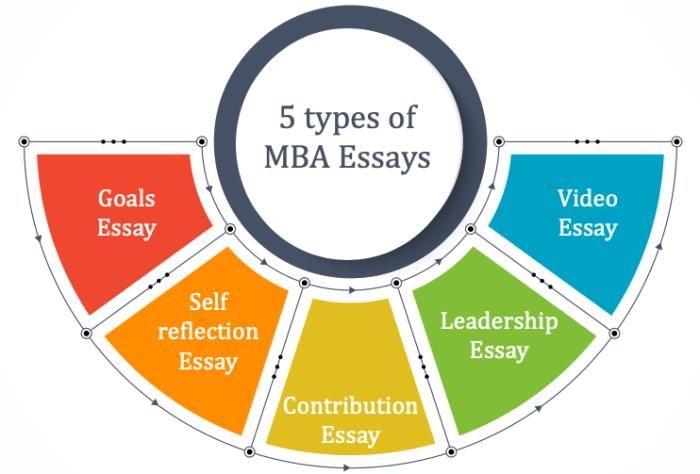MBA application essay tips for international students sets the stage for this enthralling narrative, offering readers a glimpse into a story that is rich in detail and brimming with originality from the outset. Navigating the intricate world of MBA applications as an international student can be daunting, but it’s a journey that holds immense promise for those seeking to unlock their potential in the global business arena.
This comprehensive guide will equip aspiring international MBAs with the essential tools and insights needed to craft compelling applications that showcase their unique strengths, international perspectives, and unwavering dedication to achieving their academic and professional goals.
From understanding the specific challenges and requirements faced by international applicants to mastering the art of crafting persuasive essays and acing interviews, this guide will serve as your trusted companion throughout the application process. By demystifying each stage and providing practical advice, it aims to empower international students to confidently navigate the path toward their dream MBA programs.
Preparing for MBA Interviews

MBA interviews are a crucial part of the application process, particularly for international students. They provide admissions committees with the opportunity to assess your personality, communication skills, and suitability for their program. Being well-prepared is essential for a successful interview.
Types of Interview Questions
Interview questions for international students often focus on your background, experiences, and aspirations. Here are some common types:
- Background and Motivation:These questions explore your educational and professional journey, your reasons for pursuing an MBA, and your career goals. Examples include:
- Tell me about your educational and professional background.
- Why did you choose to pursue an MBA?
- What are your career aspirations?
- How will an MBA help you achieve your goals?
- International Experience:These questions delve into your experiences living and working in different cultures. Examples include:
- What are some of the challenges you faced as an international student?
- How has your international experience shaped your perspectives?
- Tell me about a time you had to adapt to a new culture.
- How do you see your international background contributing to the MBA program?
- Cultural Awareness and Adaptability:These questions assess your understanding of diverse cultures and your ability to work effectively in a global environment. Examples include:
- How do you approach working with people from different cultures?
- Describe a situation where you had to navigate cultural differences.
- How do you see yourself contributing to the diversity of the MBA program?
- Behavioral Questions:These questions are designed to assess your past behavior and how you might handle specific situations in the future. They often use the STAR method (Situation, Task, Action, Result) to guide your responses. Examples include:
- Tell me about a time you had to overcome a challenging situation.
- Describe a time you had to work effectively in a team.
- Give me an example of a time you had to make a difficult decision.
Preparing for Interview Questions about Your International Background
Preparing for questions about your international background is essential. Here are some tips:
- Reflect on Your Experiences:Think about the unique challenges and opportunities you have encountered as an international student or professional. Consider how these experiences have shaped your perspectives, your skills, and your understanding of different cultures.
- Highlight Your Strengths:Focus on the positive aspects of your international background, such as your adaptability, cultural sensitivity, and ability to communicate effectively across cultures. Use examples to illustrate these strengths.
- Practice Answering Common Questions:Prepare answers to common questions about your international experience. Use the STAR method to structure your responses, providing specific examples and highlighting the skills you gained.
- Research the School and Program:Understand the school’s values and its commitment to diversity. Demonstrate how your international background aligns with the school’s mission and goals.
Demonstrating Cultural Awareness and Adaptability
Cultural awareness and adaptability are crucial for success in today’s globalized business world. Here are some tips for demonstrating these qualities in your interview:
- Show Genuine Interest in Other Cultures:Demonstrate that you are interested in learning about different cultures and perspectives. Ask questions about the school’s international student community and the program’s focus on global issues.
- Share Relevant Examples:Provide specific examples of how you have adapted to different cultures and navigated cultural differences. This could include experiences working in diverse teams, traveling to different countries, or learning a new language.
- Emphasize Your Communication Skills:Highlight your ability to communicate effectively with people from different backgrounds. Talk about your experience building relationships with people from diverse cultures and overcoming language barriers.
- Demonstrate Your Flexibility and Open-Mindedness:Show that you are willing to learn and adapt to new situations and perspectives. Be open to feedback and demonstrate your willingness to embrace new challenges.
Successful Interview Strategies and Techniques
- Practice with Mock Interviews:Conduct mock interviews with friends, family, or career advisors to get comfortable with the format and practice your responses. This will help you identify areas for improvement and build confidence.
- Dress Professionally:First impressions matter. Dress professionally for your interview to show respect for the admissions committee and demonstrate your seriousness about the program.
- Maintain Eye Contact and Engage with the Interviewers:Engage with the interviewers by maintaining eye contact, listening attentively, and asking thoughtful questions. This shows your interest and enthusiasm for the program.
- Be Confident and Enthusiastic:Show your passion for the MBA program and your excitement about the opportunity to contribute to the school community. Be confident in your abilities and communicate your strengths clearly.
- Follow Up with a Thank You Note:Send a thank you note to the interviewers within 24 hours of your interview. Express your gratitude for their time and reiterate your interest in the program.
Navigating the Financial Aid Process

Pursuing an MBA is a significant financial investment, and for international students, the cost can be even more daunting. Thankfully, various financial aid options are available to help alleviate the burden. Understanding the different types of financial aid, the application process, and effective strategies for securing these resources can make your MBA journey more accessible.
Types of Financial Aid for International Students
International students have access to a range of financial aid options, including:
- Scholarships:Scholarships are often based on academic merit, extracurricular achievements, leadership potential, or specific areas of study. Many universities and organizations offer scholarships specifically for international students.
- Grants:Grants are similar to scholarships, but they are typically awarded based on financial need. Some grants are specifically for international students, while others may be open to all students.
- Loans:Loans are a common way to finance an MBA, but it’s crucial to understand the terms and conditions carefully. Interest rates, repayment periods, and loan forgiveness programs can vary significantly.
- Fellowships:Fellowships are often awarded to students pursuing specific research or professional development opportunities. They may cover tuition, living expenses, and research costs.
Applying for Scholarships and Loans
The process for applying for financial aid can vary depending on the specific program and institution. Generally, the following steps are involved:
- Research available options:Start by exploring scholarships, grants, loans, and fellowships offered by the university, external organizations, and government agencies.
- Submit applications:Carefully review the eligibility criteria and application deadlines for each financial aid opportunity. Ensure your application is complete and well-written.
- Provide necessary documentation:Be prepared to submit supporting documents, such as academic transcripts, letters of recommendation, financial statements, and essays.
- Follow up:Contact the financial aid office or scholarship provider if you have any questions or need clarification about the application process.
Tips for Finding and Securing Financial Aid, MBA application essay tips for international students
- Start early:Begin your financial aid search well in advance of the application deadline. This gives you ample time to explore options and submit applications effectively.
- Network with other international students:Connect with current and former international MBA students to gather insights and recommendations for potential funding opportunities.
- Attend financial aid workshops and events:Many universities and organizations host workshops and events specifically for international students seeking financial aid. These events provide valuable information and networking opportunities.
- Tailor your applications:Customize your application materials to highlight your strengths and align with the specific criteria of each scholarship or grant.
Resources and Organizations for International Students
- University financial aid offices:Contact the financial aid office at your target universities for information on available scholarships, grants, and loans for international students.
- External scholarship databases:Websites like Scholarships.com, Fastweb, and Chegg offer comprehensive databases of scholarships for international students.
- Government agencies:Explore government agencies, such as the U.S. Department of Education or the Canadian government, for potential financial aid programs.
- International organizations:Organizations like the Fulbright Program, the Rotary Foundation, and the World Bank offer scholarships and fellowships for international students.
Embracing the Transition to Business School
Stepping into a business school environment, especially as an international student, can feel like entering a new world. You’ll be surrounded by a diverse group of ambitious individuals, a fast-paced academic schedule, and a culture that values collaboration and networking.
However, with the right approach and mindset, you can navigate this transition smoothly and thrive in this exciting environment.
Adapting to a New Academic Environment and Culture
The academic environment in business school is different from what you might be accustomed to. It emphasizes active learning, case studies, group projects, and presentations. It’s crucial to embrace this approach and be prepared to engage in class discussions and share your perspectives.
To acclimate quickly, consider these tips:
- Attend Orientation Programs:Most business schools offer comprehensive orientation programs specifically designed for international students. These programs provide valuable information about the school’s resources, policies, and cultural norms.
- Connect with Faculty and Staff:Don’t hesitate to reach out to professors and staff members for guidance and support. They are often eager to help international students adjust to the new environment.
- Join Student Clubs and Organizations:Engaging in extracurricular activities can help you connect with fellow students, explore different interests, and build a strong network.
- Seek Out Mentors:Look for mentors, whether they are faculty members, alumni, or senior students, who can provide guidance and support throughout your journey.
Building a Strong Network
Building a strong network is essential for success in business school and beyond. It opens doors to opportunities, provides valuable insights, and creates a supportive community. Here are some strategies for building a strong network:
- Attend Networking Events:Take advantage of networking events hosted by the school, student clubs, and industry organizations. These events provide opportunities to meet professionals and fellow students from diverse backgrounds.
- Engage in Class Discussions:Participate actively in class discussions, share your insights, and connect with classmates who share your interests.
- Utilize Social Media Platforms:LinkedIn and other professional social media platforms are excellent tools for connecting with classmates, alumni, and industry professionals.
Managing Academic and Social Demands
Balancing the academic demands of business school with a fulfilling social life can be challenging. To manage this effectively, consider these strategies:
- Prioritize and Time Manage:Develop a realistic schedule that balances study time, social activities, and personal commitments. Use tools like calendars and to-do lists to stay organized.
- Seek Support from Peers:Form study groups with classmates to share notes, discuss concepts, and provide mutual support.
- Take Breaks and Recharge:Make time for relaxation and activities that help you de-stress and recharge. This can include exercise, hobbies, or spending time with friends.
Resources and Support Systems for International Students
Many resources and support systems are available to help international students succeed in business school. These include:
- International Student Offices:Most business schools have dedicated international student offices that provide support with visa issues, immigration matters, and cultural adjustment.
- Student Support Services:Many schools offer counseling services, academic support programs, and career guidance to help students navigate the challenges of business school.
- Alumni Networks:Connect with alumni from your home country or region for guidance and mentorship.
Conclusion: MBA Application Essay Tips For International Students

The journey to securing an MBA admission is a testament to an individual’s ambition, resilience, and unwavering commitment to personal and professional growth. For international students, this journey takes on an added dimension of navigating cultural nuances, adapting to new environments, and showcasing their unique global perspectives.
By mastering the art of compelling storytelling through essays, letters of recommendation, and interviews, international students can effectively communicate their value and potential to admissions committees. The ultimate goal is to not only secure a coveted spot in a top-tier MBA program but also to leverage the transformative experience to shape a future brimming with possibilities.
Query Resolution
What are the most common mistakes international students make in their MBA applications?
Common mistakes include neglecting to tailor their essays to each specific program, failing to demonstrate a deep understanding of the target school’s culture and values, and not showcasing their international experience in a compelling way.
How can I overcome language barriers in my MBA application?
Taking language proficiency tests like TOEFL or IELTS is crucial. Additionally, seeking feedback from native English speakers on your essays and practicing your interview skills can help.
What are some resources available for international students seeking financial aid for MBA programs?
Many universities offer scholarships specifically for international students. Organizations like the Fulbright Program, the Rotary Foundation, and the Ford Foundation also provide financial assistance.